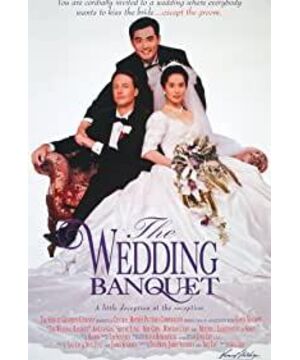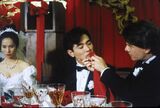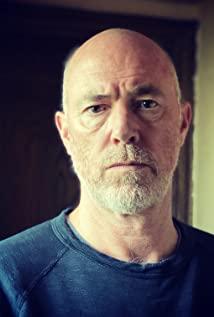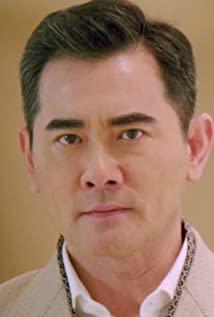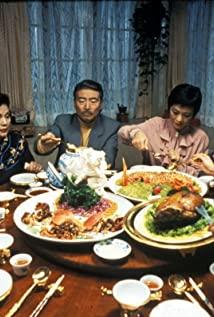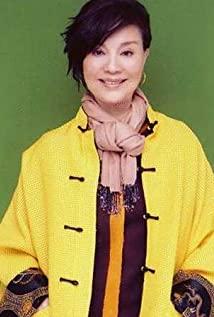Speaking of it, it is a heavy story, but the process of watching it is like a comedy, and it is a high-level comedy, an essential comedy. I didn’t laugh until my stomach hurts or roll, but I can’t close my mouth. How did Ang Lee do it?
They are all about the collision of tradition and modernity, but this one is different from the other two. Tradition stands on the dark side from beginning to end, like an unreasonable shrew with akimbo, very annoying. I have eaten wedding wine many times, and almost every time I sympathize with the hosts, the bride and groom, they are so embarrassed, and the guests are so lewd, they are so messed up that there is no human form. However, this is a tradition, and it is a lot of truth. A few days ago, I also heard that if you are moving, you must also remove the back door to leave a back path. Such strange rules, I already know a lot, and there are a lot of them I haven't heard of yet. I used to think that I didn't even know, how can I inherit the tradition? What if you know all about it? will do it? How much does the ancestors have in our hearts? This is not a bad thing, because the rules of the ancestors now seem to have no sense at all, either mean, or rude, or stupid, or absurd, why should they inherit.
In order to highlight this collision, Ang Lee chose a more extreme theme. Wei Tong, a Chinese homosexual in the United States, faked marriage in order to satisfy his parents' strong thirst to hold a grandson, and his parents had to travel from Taiwan to the United States to host a wedding banquet for him. . Think about it, it is a story of constant conflicts and contradictions. The same is true, and it evolves according to the predictable process. However, Ang Lee emphasizes some details of the performance of traditional phenomena, and softens these conflicts. They are only looming. . Looking at it like this, it is not particularly heavy, but the harm of tradition to human nature can still be clearly felt. At the wedding banquet, focus on performance. The scene is big, crowded and noisy. Two people who are in harmony with each other, show their false love in public, and are even forced to pretend to be real when they are making a new house, and the women are pregnant. Tradition is prominent, but no matter how you look at it, it is suspicious. Tradition is a hypocrite, tradition is a persecutor, tradition is always self-righteous, and tradition is always baseless. Lang Xiong, who was very cute in the other two parts, was a stubborn old man for most of the first half of the time. He was not cute, but ridiculous and deplorable. He loved face and missed his grandson.
How can such a tradition go forward? Therefore, the compromise of the tradition at the end is inevitable, and the conflict at the end did not reach a climax. Lao Gao calmly accepted this fact. Before Wei Tong confessed his sexual orientation to his mother, Lao Gao had already Knowing, "I observe, I understand, he is my son and I still can't see it?" I even had blessings to my son's boyfriend, Simon. The last sentence, Lao Gao said at the airport: "I am very happy." The conflict was easily resolved, too simple to be believed. But how? The reason is not just the "children's grandmother can't help the mother" summed up by Gao's mother, but also the traditional old Gao, who was forced to reflect on himself this time.
The actor, Zhao Wenxuan Langxiong Gui Yalei Jin Sumei, has nothing to say, almost all the essence of Taiwan's film industry. Especially the two old people, it was really full of drama, like every old man around, they always felt that there was something extra. Zhao Wenxuan, fortunately, is very suitable for this role, and it seems that he is the most suitable for playing gay in Taiwan. And the foreigner who played Weitong's boyfriend, how a perfect combination of Chinese and Western, was reasonable to all arrangements, calm and considerate of the overall situation, and affectionate, was the cutest character. All in all, the actor's performance was perfect.
A film with a sharp subject matter, at that time, in the hands of Ang Lee, it was actually peaceful and interesting. Compared with this movie, "Brokeback Mountain" is really boring. Maybe it’s a cultural difference. I think Ang Lee has a lot of room for development in the United States, and the film also retains the characteristics of peace and nature, but it lacks transparency. Once peace is transparent, it will be interesting. There is another reason. "The Wedding Banquet" focuses on family drama, while "Brokeback Mountain" focuses on love and family equally, and the focus is not prominent.
In one detail, at the wedding banquet, a foreigner sighed: "I thought Chinese people were all docile, silent and mathematical geniuses..." Before he finished speaking, a Chinese person behind him spoke with a probe: "You are seeing the result of five thousand years of sexual repression. "These two sentences can be used as footnotes for the entire film. And this Chinese who spoke up was the guest star of Ang Lee, who was still very young at that time. The Chinese are indeed submissive and silent, and the madness at the wedding shows that the Chinese turned out to be anti-traditional by using tradition, and even the factors of venting resistance can be self-sufficient. It is conceivable that tradition is never as easily disarmed and surrendered as at the end of the film.
View more about The Wedding Banquet reviews


